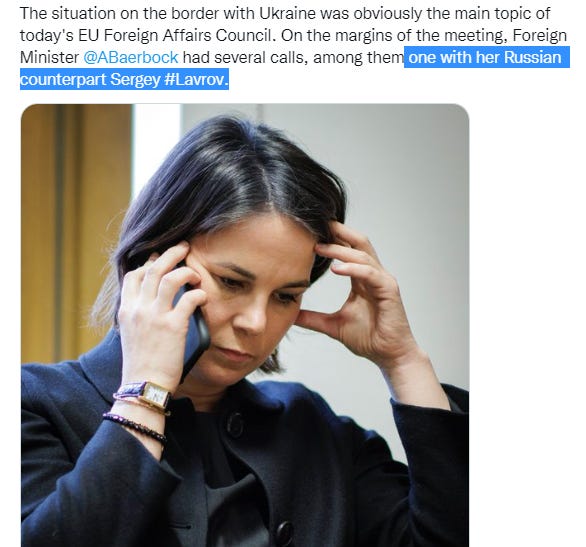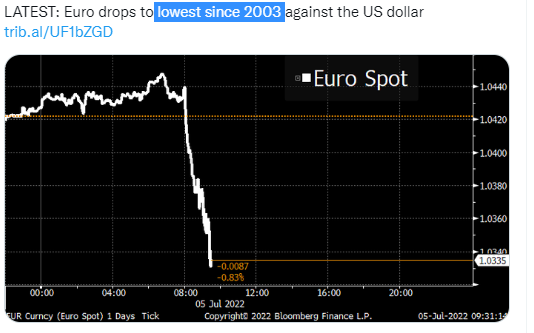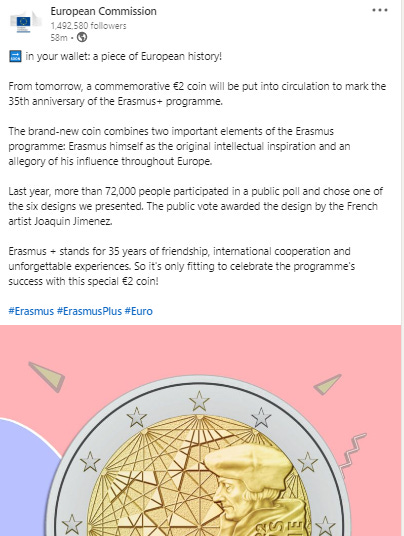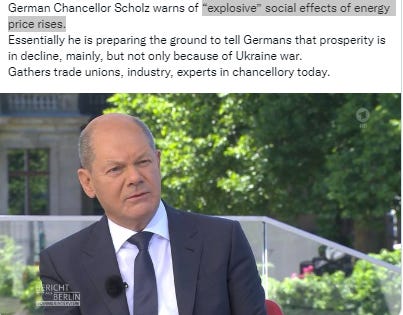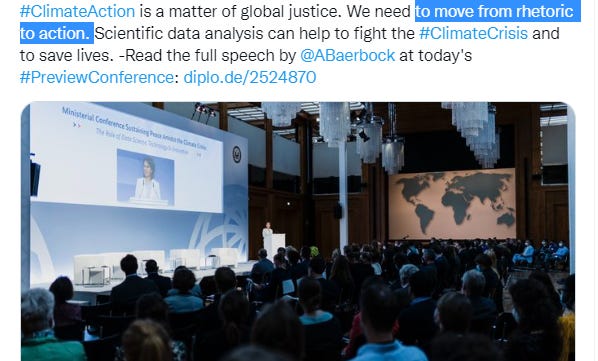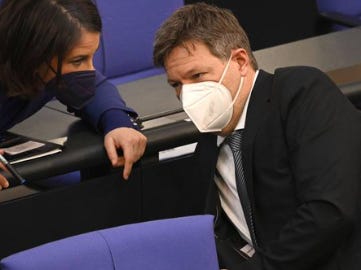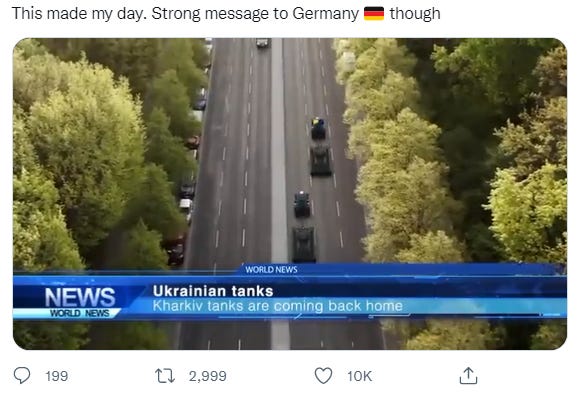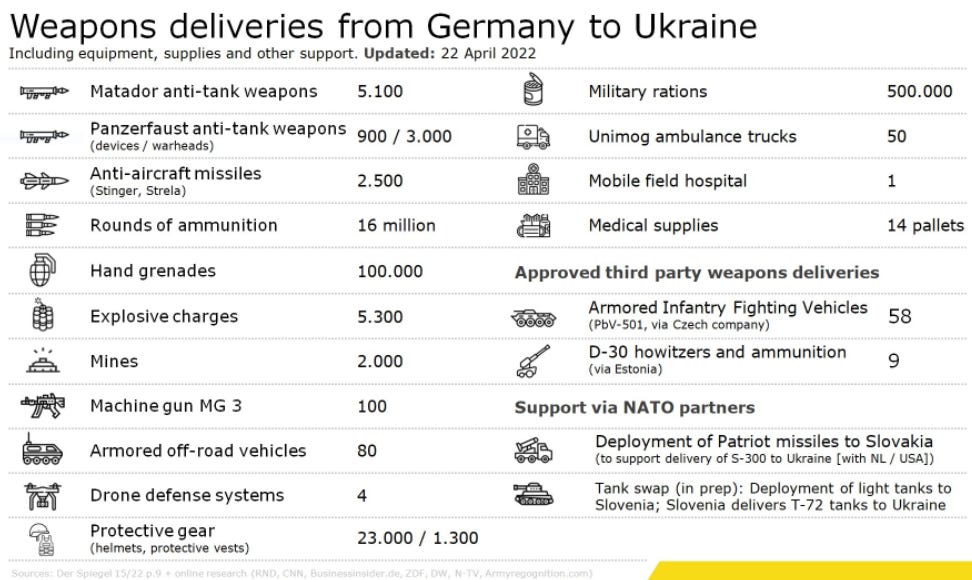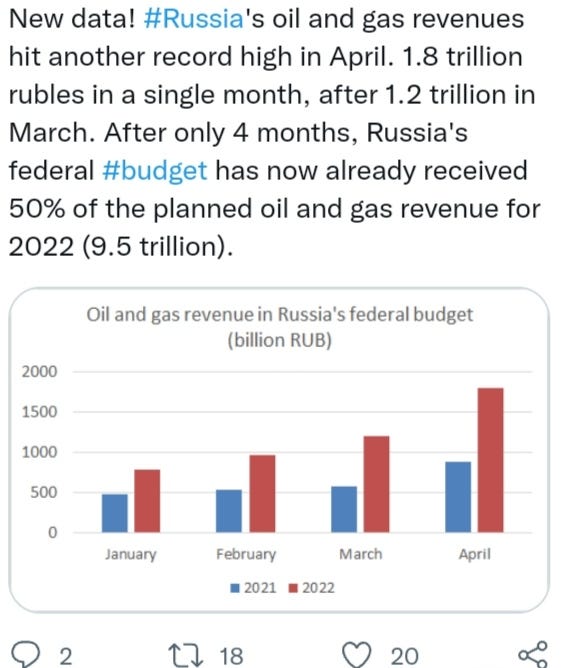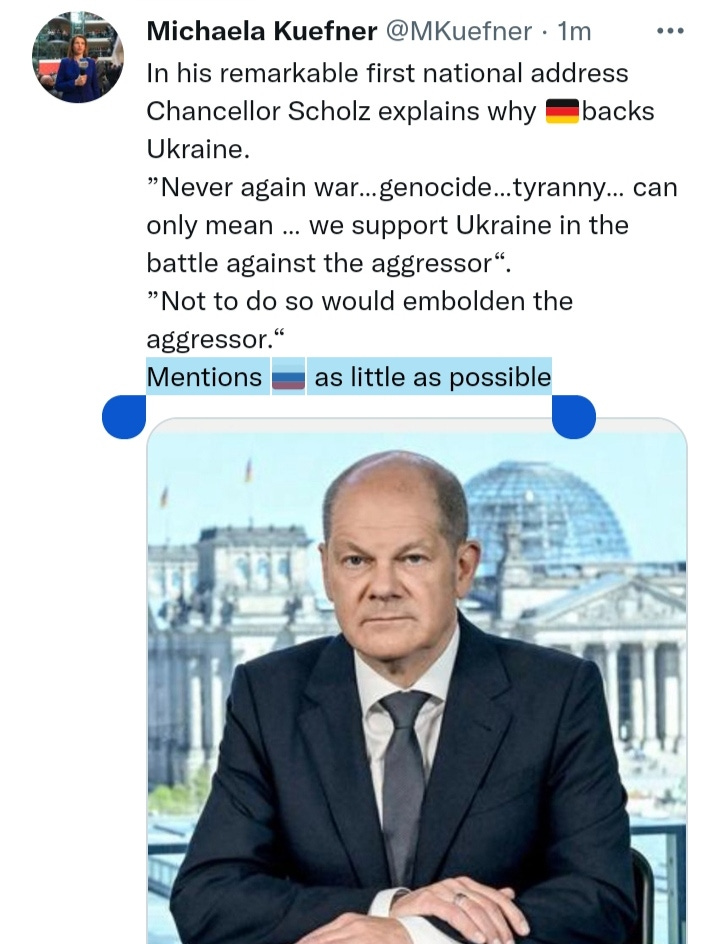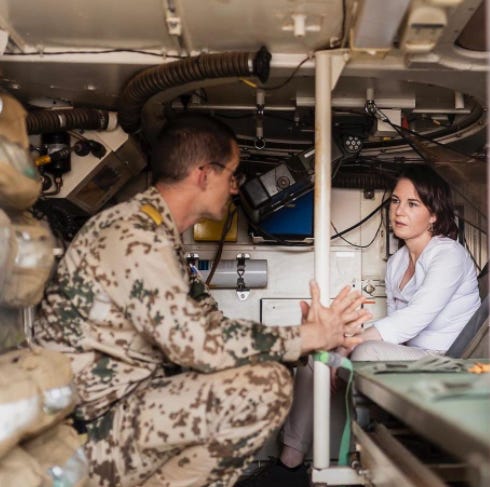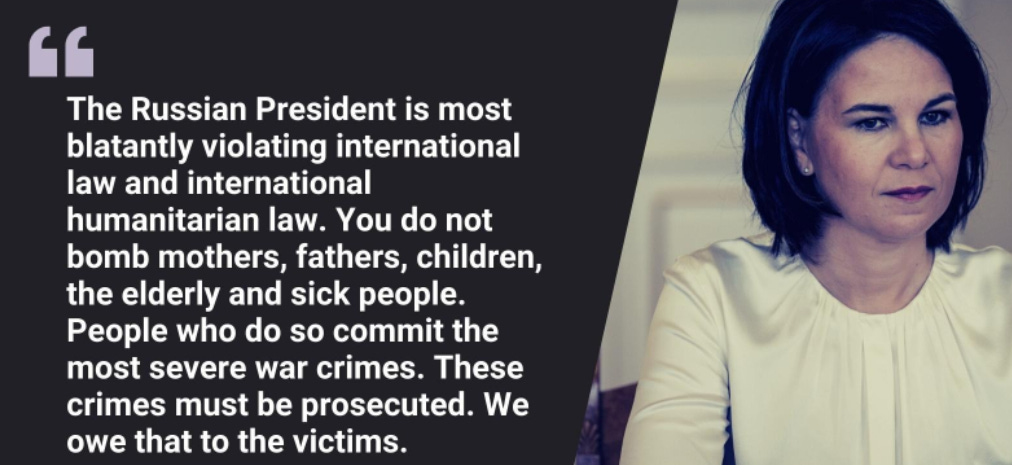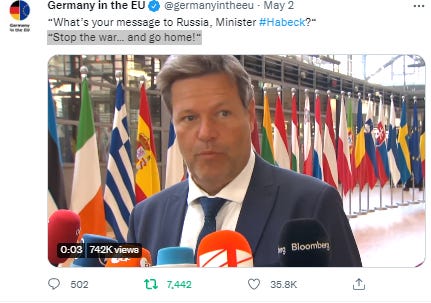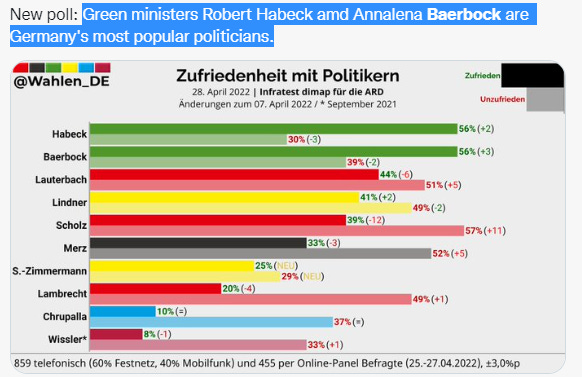Germans may be divided on whether to send heavy weapons to Ukraine, but on the issue of an energy embargo, a majority is in favor. According to a recent national poll, 54 percent favor a gradual halt, with a further 22 percent supporting an immediate stop.
Whether public pressure is a driver of change or there is actually little change and the intransparency of inner-government working processes causes merely an impression of Germany policy change on sending weapons to Ukraine. The only thing worse than your policy area getting no attention is your policy area getting prime time attention.
Ukraine, which was pillaged by Germany during World War II, by the end of which it had lost more than 15 percent of its population, certainly won’t forgive and forget about “Barbarossa”. Germany won’t have any real credibility within the transatlantic alliance either (no matter how many billions it commits to spending on defense) until there’s an honest reckoning with the history of the Angela Merkel-Vladimir Putin years. As Germany knows all too well, even if it’s possible to hide from history for a time, there’s no escaping it.
Would be wrong to think that Europe (include Germany) is only “expected” or “demanded”. The Ukrainian officials we met are not asking for a gift, even if its support is hoped for. It is not an ideology, but a set of concrete achievements that combine ideals and responsibility, good management and commitment to citizens. What Western Europe (especially Berlin) has largely forgotten: Europe is also a practical idea. And for (specific) between German public: weapon really a rare idea.
Imagine: DC, across Atlantic, has sent 62 flights-shuttle cargo since January 2022 to arming Ukraine, and Germany, only less than 700 km from Lviv (the most populous cities in Western Ukraine) only sent less than 15. But arguably: “send a weapon” in German society is a very rare option. More rare: amid Green Party leaders and voters. Then, Annalena Baerbock (FM Germany; Green Party), is a solid supporter of the “sending weapon policy” to Ukraine. As Germany ties itself in knots over whether sending a few rusty tanks to Ukraine would make it a participant in the war in Putin‘s eyes, the Biden administration from DC is bragging that it helped kill Russian generals. Her decision very clear really hawkish than Chancellor Scholz.
To imagine how significant Howitzers by Germany (7 by Germany, 5 by Netherlands) today will improve Ukraine in the battlefield: Long-range artillery (especially paired with PGMs) will be absolutely key for defeating and reversing the Russian advance in the Donbas. A single battery could wreak havoc on Russian armor and positions. Next step Ukrainian transition/integration of advanced NATO-standard systems. Training Ukraine military representatives to commence in Germany next week (which in the Bundeswehr usually takes up to five months).
Maybe the Green Party like Annalena Baerbock and Robert Habeck facing a dilemma like this: In war, are pacifist vibes in the spirit of Green Party same parallel with morale on the Ukraine issue? Or does morale flow from vibes? Can there be good vibes in retreat? Maybe vibes capture a change in morale in the heart of the Green Party leaders, so (currently) support for sending more and more weapons to help Ukraine. with “Truth”, “atrocities”, and “pity situation in Ukraine”, not too far from Germany, and maybe some worryness if Germany facing like Ukraine now, which meant own personal political convictions transmuted into verse: currently all leaders of Green Party Germany support “Pro-Weapon”, or we call ”a Hawkish”.
Such a description of the war (especially by Western media, like German media itself) might satisfy desires for political categorization (though whether politically didactic work actually does the instrumental work its advocates want is often left as an unstated and rather large assumption), but it leaves aside something critical.
The battle of the machines is so colossal that man almost completely disappears before it. Often already, caught in the force fields of the modern battlefield, it seemed to me strange and scarcely believable. On Ukraine soil, we saw old weapons Ukraine mixed with NATO-standard weapons, to fight old and new Russia standard military equipment (& maybe China equipment). The political communication by Olaf Scholz himself, however, is so piss poor that you could get the impression Germany was doing absolutely nothing on sending a weapon to Ukraine. Scholz’s default approach is to work out details before announcement (which takes more time than public opinion-cycle / German-user twitter-cycle). Think of the bad press with example faulty Strella or current ammunition issue for Gepard (spat with Switzerland about neutrality spare part of Gepard).
If there were not ongoing wars, or as if the fact that there are ongoing wars is at best an occasion for light German political posturing, Russia invasion since February 24th 2022 make a seismic change-perception in the German society about “weapon” and “defense”.
A current German obsession revolves around the question of whether it could be considered an active participant in the war under international law if it trains Ukrainian soldiers how to use the heavy weaponry it plans to provide. Then, German imagine Kremlin abruptly launch ICBM to destroy entirely Berlin, same as like 1945. In March, the research unit of the Bundestag (for many the gold standard of non-partisan analysis) opined that training Ukrainian would indeed be a bridge too far. Given Putin’s slavish adherence to international norms, this is clearly a key question.
More seriously, the German intelligentsia’s notice that the US and the other guarantors of German sovereignty are not only providing heavy weaponry, but intelligence that has led to the killing of Russian generals, and the sinking of the Kremlin. NATO already well beyond the red line Germans are having panic attacks over. So this debate that has consumed seemingly every news program, op-ed and talkshow for days — is completely divorced from reality.
Some Germany citizen still argue the “very slow” decision on sending a weapon, and mixed with very bad political communication by Scholz, just because Germany (or Scholz himself) moral compass is “balance budget”: Germany suffered a big challenge to replace oil and gas by Russia (so Germany must pay more from another countries), then COVID impact on Germany economic is bigger than expected.
Then, European countries (not only Germany) must acknowledge if they really (shifted) oil - gas supply to tightening sanction to Russia: Unless demand is addressed, the geopolitical risk of long-term sanctions against even mid-level oil producers is incentivising regime change ambitions to return the lost oil exports to world markets: the second Iraq (120 billion barrels oil proven-reserves) war. Unrealistic to expect others not to buy Russian oil now that the EU is phasing out purchases. And given price effects do we really want to shut out the second largest producer from global markets completely?
Russia is already strengthening more order-deal not only with Saudi (the same net oil exporter country), but also Turkiye (82 million population, nearly same as Germany) and India (2nd most populous country in the world). Pushing for a global embargo against Russian oil is not only a debate EU & US won't win. This will backfire and fuel Beijing's narrative that Western policies & sanctions are to blame for global effects on energy prices & food security, not Russia's war.
Germany’s stubborn insistence on engaging with Putin in the face of his sustained aggression (a catalog of misdeeds ranging from the invasion of Georgia to assassinations of enemies abroad and war crimes in Syria) was nothing short of a catastrophic blunder, one that will earn Merkel a place in the pantheon of political naiveté alongside Neville Chamberlain.
Slowly but surely, it’s begun to dawn on Germans that Angela Merkel’s soft-shoe approach to Russia — which reached its zenith with the 2015 decision to green light the Nord Stream 2 pipeline despite Russia’s annexation of Crimea and its role in the separatist war in eastern Ukraine — didn’t just open the door for Putin to go further, it effectively encouraged him to do so.
While Angela Merkel deserves most of the blame for falling into the Russian leader’s trap, the truth is that Germany’s entire political class is guilty. As Angela Merkel’s finance minister and vice chancellor, the current Chancellor Olaf Scholz, whose Social Democrats were the driving force behind the Nord Stream pipelines, championed the notion that the best way to deal with Putin was through never-ending “dialogue.”
Thanks Angela for 16 years of duty, but — maybe, her worry about Russia (then her decision being too soft about Putin), trauma about 1945 and East Germany, gradually influenced a lot of the German public. Maybe some German citizens are very normal to imagine Russia will push movement to Poland and even Germany soil, if there is more and more frustration fighting in the Ukraine soil.
So, (on German perception) “we prefer to not so much send weapons to Ukraine, contrary to the decision by all NATO members, just to make sure the Kremlin does not occupy Berlin”. If so, will we see full mobilization in Russia? If so, will it have a significant impact on the ability of the Russian military to advance in Ukraine after 74 days? Or would it not matter all that much because even extra fighters can’t make up for all the other problems they have? Or if the Kremlin is really angry because they are stuck in Ukraine, will Poland or even Germany be the next target?
In what secondary theaters should the West mess with Russia and in what areas is continued cooperation so important that it should continue? If the Ukrainians can defend themselves against Russia’s attack, would Kyiv decide to try to liberate the entire country from Russia’s occupation? If so, how would Moscow react if they perceived the “loss” of Crimea as a realistic possibility? What does all this mean for American engagement? Will Russian aggression lead Washington to refocus on Europe? Doubling or even 4x personnels in Ramstein to prepare a bigger war in the heart of Europe soil? Or will the ineffectiveness of the Russian military convince Americans that they can afford to focus on China?
Green Party parliamentarian and former floor leader, in any case, is currently urging the government more vocally and decisively than most others to supply more weapons to Ukraine, and to begin supplying heavy weapons as well. “If the world changes, our politics must change,” Annalena Baerbock herself said like this. It's not really the kind of transformation you could have seen coming.
Even not only “rare” transformation in Germany: it’s not a natural fit. This major shift in German defense was decided by a government led by a chancellor from the Social Democratic Party, which has traditionally supported Russia-friendly policies, with a foreign minister from the Green party, which has roots in the pacifist movement, and a finance minister from the Free Democratic Party, long committed to tight budgets. Many external observers had worried about what would become of Germany’s defense policy after Angela Merkel’s conservative party, which has long styled itself as the guardian of the German military, was voted out of office in 2021.
Fascinating that many German people who were opposed to almost all arms exports for multiple decades are now among the strongest voices calling for heavy arms deliveries to Ukraine. A big chunk of the political landscape has changed in a matter of months since February 24th, and Annalena Baerbock, a dovish, a Green Party leader, very brave and rare, starting, once again, when she said “If the world changes, our politics must change” (Feb 25th).
It's inaccurate to say that the Greens were entirely pacifist before February 2022. They supported some Bundeswehr missions abroad and they also debated stuff like humanitarian intervention without UN mandates. Even still, they've almost done a 180 in weeks. The magnitude of this shift is particularly interesting because the Greens have a bit of a reputation for being particularly ideological due to their stance on nuclear power and so forth. In reality, they've been willing to change their position much more than others.
What they got wrong (except Annalena Baerbock since war began Day-1) was heavily underestimating the importance of military power in international politics. To their credit, they're changing course now. Somewhat amazingly, it also looks like they've been able to take their voters along with them. It's remarkable.
Under international law, arms deliveries do not constitute participation in a war, Annalena Baerbock repeatedly said. Careful considerations are necessary, she said, but that there was no reason to stir up panic. Since Putin doesn't care about international law, she said, it is important how he evaluates certain decisions made by Germany. "As such, what Mr. Putin thinks might be a step is solely at the discretion of this president."
Although there is no single definition of feminist foreign policy, most supporters of the approach tend to regard calls for arms delivery and rearmament as a step backward. Annalena Baerbock is trying to get around that contradiction by repeatedly speaking of the victims of war, of the women and children who are affected, which is also a component of this school of thought. But none of that changes the fact that the foreign minister is currently trying to avoid casualties by delivering heavy weaponry. This is why Annalena Baerbock years from now maybe deserves a Chancellor seat: she is really brave, nearly alone from Day-1 or day-2 war, to push opinion between Germans, to change ideas about “helping with weapons”, a taboo since WW2.
Last spring, an organization called BundeswehrGrün was founded to promote exchange between the army and the Green Party. Hecken is one of the organization's two chairs. The association now has just under 60 members, most with some form of ties to the Bundeswehr. It may seem rather odd that a soldier holds such an important position in the BAG responsible for addressing peace issues. Because of the war, there has been a change in thinking among many. That was also necessary.
It's easy to argue in favor of higher defense spending while Russia is waging war in Europe. But what happens when the guns fall silent? Will the Greens change course again? How about the German budget now suffering to search for alternative suppliers (of oil and gas) and paying more expensive than a year ago? Possible, but right now it doesn't look that way.
Leading Germany politicians could be heard musing about the need to look at common “projects” to unite the three parties. This may not be what they had in mind, but it is what they have been given. It's always healthy for a democracy if there is a diversity of opinion within the moderate forces, if points of view that deviate from the majority opinion are expressed within this moderate spectrum – and they aren't only articulated in the margins by extreme forces. This is particularly true of the big issues: if Germany changes opinion just because of the Ukraine situation (to be a “Good Hawkish” than “Putin’s enabler”), maybe in another conflict, Germany will have a more option and better solution to help “the most suffered”. This seismic change, started by Annalena Baerbock effort, a first ever female Foreign Minister in 151 years of German history.




